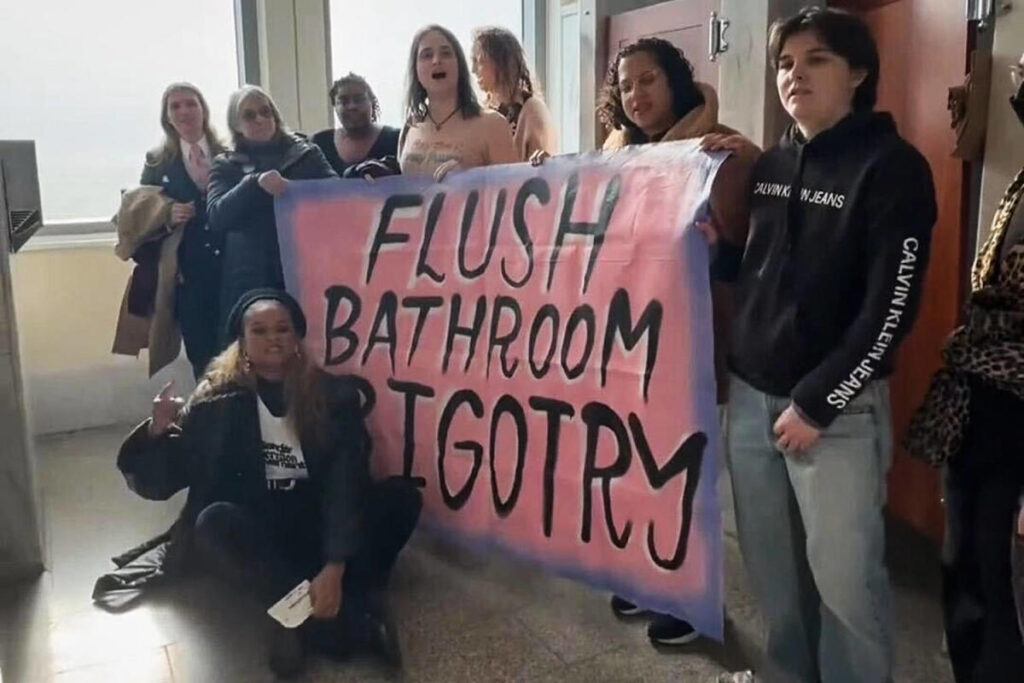A significant protest unfolded at the U.S. Capitol when over two dozen transgender individuals and their allies staged a sit-in at a women’s restroom to oppose a new policy that would prevent the first openly transgender member of Congress, Rep.-elect Sarah McBride, from using these facilities. The demonstrators gathered in the Cannon House Office Building, reflecting their discontent with a resolution introduced by Rep. Nancy Mace of South Carolina. Mace’s proposal aims to bar lawmakers and House employees from using single-sex facilities that do not correspond to their biological sex, a measure she specifically associates with targeting McBride. As part of the protest, approximately 15 of the demonstrators were arrested for violating crowding regulations, according to U.S. Capitol Police.
The sit-in targeted the women’s restroom closest to House Speaker Mike Johnson’s office, signifying the protestors’ desire to address issues at the very heart of government decisions. Through chants like “Speaker Johnson, Nancy Mace, our genders are no debate,” the demonstrators highlighted the perceived threat these regulations posed to transgender rights and dignity. Abby Stein, a rabbi and trans advocate not arrested during the protest, emphasized that the movement’s message was directed not only at Republicans but also at Democrats, indicating dissatisfaction with the lack of support from all sides regarding transgender rights.
Mace’s stance included a strong anti-trans sentiment, as she publicly expressed her intent to oppose any individual she perceives as a “man” from entering women’s restrooms. This rhetoric sparked further anger among demonstrators and advocates, who argue that this policy is not merely about bathroom usage but instead concerns broader issues of safety and rights for transgender individuals. The sit-in was designed to amplify their voices and make it clear that they cannot be overlooked in political discussions that directly affect their lives.
Among those arrested were Chelsea Manning, an advocate and former Army intelligence officer, and Raquel Willis, a trans journalist. Their participation underscored how prominent voices in the movement are standing firm against what they view as discriminatory legislation. They and their fellow advocates articulated the necessity of allowing trans people to use restrooms without fear, likening their struggle to the broader fight against discrimination and violence faced by marginalized communities.
Willis noted a growing discontent among trans activists regarding political complacency in the face of this anti-trans sentiment. She mentioned the significant funding used against transgender rights in the lead-up to the 2024 elections, indicating a feeling that both major parties are failing to adequately support and protect transgender individuals. She urged Democratic leaders to take a stand, calling for an active opposition to Mace’s proposal through tactics like filibuster, reinforcing the demand for urgency in protecting the rights of trans individuals.
In contrast, McBride has focused her efforts on the broader issues facing her constituents in Delaware, stating the importance of prioritizing practical solutions over symbolic confrontations. Following the protest, she reaffirmed her commitment to comply with the eligibility rules set by Speaker Johnson while suggesting that political distractions should not hamper her legislative efforts. Her response illustrates the complexity of navigating personal identity within the political realm, emphasizing a desire to address substantive issues that affect her constituents while still acknowledging the challenges posed by current political narratives surrounding her identity as a transgender lawmaker.

